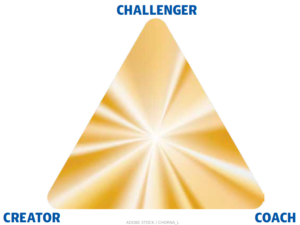Create Your World, Fellows!
In the 21st century, the word creator has a somewhat relaxed meaning. We may hear about “YouTube creators” or “job creators” and immediately roll our eyes. The creator in the winner’s triangle is less about the creation of products and services than the creation of worlds. Creators are outcome-oriented and embrace a sense of agency to create the world they would love to live in. In contrast to the victim role—a term I don’t like—creators contextualize problems within larger systems and consider how they can produce solutions to issues.
For rheumatology fellows and rheumatologists, this is an essential trait. Rheumatology is defined by creativity and a desire for creative solutions. The proliferation of new science within the worlds of immunology and musculoskeletal medicine is not the result of frustration, but rather of imagination—the ability to see a world in which arthritis and autoimmune disease are relegated to minor nuisances. Throughout their journeys, rheumatology fellows are at the leading edge of this creativity. Embracing the incremental steps is what’s necessary to continue the steady progress we have made to improve the world.
It may sound like a lofty goal, but I assure you that becoming a creator is not a burdensome task. Certainly, it requires a mindset toward resolving a dynamic tension between the world today and a dream. Even more important is a conviction that small, incremental steps are leading to our continual growth and to a better world at large. Deriving satisfaction from seeing each patient as a learning opportunity, joy from minor discoveries gleaned from textbooks, journals and The Rheumatologist, and camaraderie from colleagues are all actions of creators within rheumatology. But as Acey Choy mentions, you cannot do it alone. Being part of a winner’s triangle lightens the load, so you can be the most creative creator imaginable.
The Coach in the Corner
Anyone who has ever watched a movie or read a book knows what it means to have a coach. They come in many different shapes, sizes and forms, but they all are supportive of the main character or, in this case, the creator. Coaches dig deep within themselves to find compassion and empathy for others. Unlike the rescuer in the drama triangle, coaches recognize the sovereignty of those who seek their help. Instead of appropriating another person’s problems as their own and solving those problems directly, coaches recognize the agency of the people they coach and help them navigate ways for creators to obtain better outcomes.



